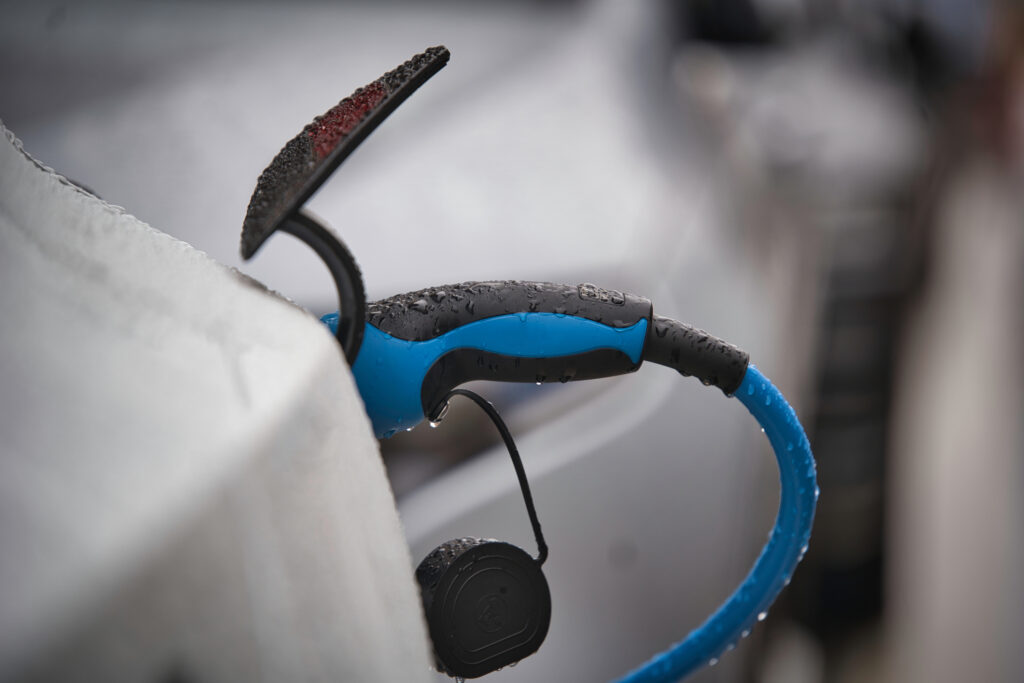Many new EV owners worry about charging their vehicles in wet weather. After all, we’ve always been told that electricity and water don’t mix. However, charging an electric vehicle in the rain is completely safe thanks to sophisticated safety features and weatherproof design.
Understanding EV Charging When It’s Raining
Modern EV charging equipment undergoes rigorous weatherproofing and safety testing. Both the charging stations and vehicle charging ports include multiple layers of protection against water infiltration. These safety measures allow for charging even during heavy rain or snow.
How EV Chargers Stay Safe in Wet Weather
Both public charging stations and home EV charging systems include key safety features for harsh weather :
Weatherproof Design
Charging equipment must meet strict weatherproofing standards set by the National Electrical Code. This includes sealed connections, watertight housings, and proper grounding systems.
Multiple Safety Protocols
EV chargers are designed to only send a flow of electricity when the charger is securely connected to the vehicle. So if you drop the charging cord in a puddle, or if it gets wet from the rain, you have nothing to worry about. The system has already paused the flow of electricity to prevent any safety issues.
Protected Charging Ports
Your vehicle’s charging port includes special seals and protective covers. These keep water out during charging and while driving in wet conditions.
How to Safely Charge Your EV in the Rain or Snow
While charging your electric vehicle in wet weather is safe, follow these guidelines for the best results:
- Keep the charging port clean and dry before plugging in
- Avoid standing water around charging equipment
- Use covered charging stations when available
- Follow manufacturer recommendations for adverse weather
Can you Drive an Electric Car in the Rain?
Yes, you can drive an electric vehicle (EV) in the rain. They are designed to work well in different weather conditions. EVs are safe to use in wet weather because their electrical systems are insulated and waterproof. The battery units are also sealed to keep them safe. Plus, EVs have safety features that turn off power and protect the battery packs if there is a short circuit or accident.
Common Myths About EVs and Water
Let’s address some common concerns about charging EVs in wet conditions:
“Charing an EV in the rain is dangerous”
EV charging equipment is specifically designed to operate safely in wet conditions.
“Rain affects charging speed”
Modern charging systems maintain a consistent performance regardless of weather conditions.
“Wet charging ports are dangerous”
Charging ports include multiple safety features to prevent any electrical hazards from water exposure.
Maintaining Your EV in Wet Climates
Regular maintenance helps ensure reliable charging in all weather conditions:
- Keep charging port covers closed when not in use
- Regularly inspect cables for wear
- Clean charging connections periodically
- Report any unusual charging behavior to your dealer
Water Exposure Emergencies
While EVs can handle normal rain without issue, extensive flooding can be dangerous. To protect yourself and your family, always:
- Avoid driving through deep water
- Have your vehicle inspected if exposed to flooding
- Follow manufacturer guidelines for water exposure
- Contact your dealer if your charging system gets submerged
The Future of EV Charging
While charging your electric vehicle in the rain is safe, it’s important to have your charging station professionally installed. Black Hills’ licensed electricians ensure your EV charging system is installed correctly, with all necessary weatherproofing and safety features in place.
Since 1993, we’ve helped Olympia homeowners embrace new technology safely and efficiently.
Ready to install a home EV charging station? Call (360) 822-9659 to schedule your free consultation with our expert electricians.

